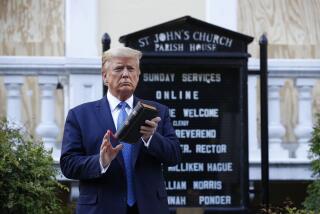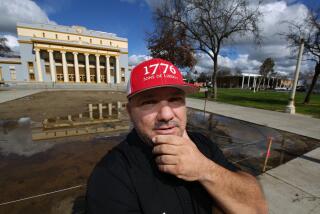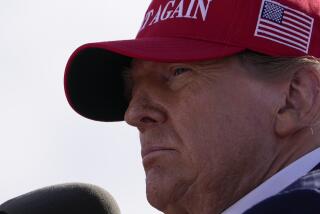Here’s how Trump’s gift for coining catchphrases could backfire

Judge Richard R. Clifton noted that the seven countries covered by the order make up only a small part of the world’s Muslim population. (Feb. 8, 2017)
Of all his political gifts, President Trump’s knack for branding his ideas and his opponents with unforgettable slogans and monikers may be the one that inspires the most awe from allies and adversaries.
But the legal and political fight over Trump’s travel ban affecting seven Muslim-majority countries has demonstrated the potential downside to his flair for making his ideas stick in the public imagination. Even as his allies insist he is not instituting a “Muslim ban,” Trump’s own attempts to sell the policy as just that may prove its undoing.
Unlike conventional politicians, who use careful language to leave themselves room to slip and slide away from their promises, Trump repeatedly employs the type of sizzling sales pitches he learned in real estate and media.
“A typical White House doesn’t need to finesse because they have a president who understands that technique already,” said Frank Luntz, who has spent decades advising Republicans in the art of using rhetoric to frame debates. “Finesse and Donald Trump are not two words you use in the same sentence. But you always have to put in the ‘but.’ This has worked for him.”
Trump’s sloganeering remains a valuable tool for rallying support for his ideas. But as the late Mario Cuomo might have said, Trump is fast learning what it’s like to campaign in marketing and govern in prose.
All presidents face that reality, usually when they balance campaign promises against the realities of complicated policy, bureaucratic resistance and Congress. But for Trump, who once vowed to fulfill “every dream you’ve ever dreamed,” the drop-off could be steeper.
The Affordable Care Act was not just a bad idea to Trump. It was a “disaster,” a “catastrophe,” that if not repealed and replaced “will destroy American healthcare forever.”
Despite the urgency he conveyed on the campaign trail, Trump said this week that it may take another year to replace Obamacare.
Almost everyone has heard the call-and-response climax of a Trump campaign rally. “We’re going to build the wall,” he says. And who’s going to pay for the wall? “Mexico!” the crowd roars.
But Trump has yet to outline specifics on how to compel Mexico to pay for it against the country’s will. He is now asking Congress to at least initially pay for a wall, which Homeland Security Secretary John F. Kelly described Tuesday as partial.
Trump has also backed off his pledge to prosecute election opponent Hillary Clinton, whom he had branded as “crooked Hillary,” and he continues to heap praise on former President Obama, whose birth certificate he long questioned as “a fraud.”
Yet it’s the travel ban on immigration that faces the most immediate test.
Trump initially proposed a temporary “total and complete shutdown of Muslims entering the United States” in December 2015. In the months since, he adopted the media shorthand of “ban” as his own.
The final executive order, issued a week after Trump’s inauguration, fell short of a full Muslim ban, suspending entrance for asylum seekers from around the world as well as inbound travel for citizens of Syria, Iraq, Iran, Sudan, Libya, Yemen and Somalia.
Just before signing it, Trump said in a radio interview that Christians fleeing persecution from Syria would get preferential treatment once refugees are allowed in, adding to the sense that he was initiating a religious test.
Once opponents began filing legal challenges that attacked the order as religious discrimination, White House aides began distancing themselves from the word “ban,” even when it was not used in conjunction with the word “Muslim.”
Press Secretary Sean Spicer chided the media for using the term, insisting that Trump was only using it because the media was calling it a ban, a contorted explanation that inspired a biting sketch on “Saturday Night Live.”
By the time Trump advisor Kellyanne Conway appeared on CNN on Tuesday just before crucial appellate arguments, she had sterilized the order to “extreme vetting from seven narrowly prescribed countries in a very temporary way.”
Selling a major policy in such clinical terms is never easy. But it might have been easier to recast Trump’s executive order if the initial sales job were not so vivid.
“It’s not like just a speech,” said Peter Hart, a Democrat who owns a political research firm. “It’s something he continually reinforced.”
Obama, a far more cautious politician, had several memorable phrases that came back to bite him, including a “red line” he drew against Syria’s use of chemical weapons that he failed to enforce, and a false promise that Americans who liked their health insurance plans could keep them under Obamacare.
Hart noted that Trump, less than a month in office, already “has used a half a dozen phrases that every American can probably recite.”
But Hart, like others in his field, believes Trump’s ability to brand is “a modern miracle” that has already proven a big benefit. And the costs may not prove fatal. Trump has shown a keen ability to distract from setbacks by causing more controversies.
And while Trump’s low approval ratings have set records for a new president, his core backers, who have largely stuck with him, tend to view his slogans as opening negotiating positions rather than as hard-and-fast commitments.
“Any other politician would already have been punished for what looks like a retreat from stated policies,” said Kevin Madden, a Republican communications consultant who advised Mitt Romney. “But many of Trump’s most ardent supporters give him more leeway since they are more accustomed to Trump, the celebrity businessman from ‘The Apprentice,’ than they are Trump the politician.”
Trump views his branding prowess as an indispensable weapon. He references the “lying and dishonest media” at every turn, calls his club in Florida the “winter White House” and ends many of his speeches and news releases with some form of the phrase “Make America great again.”
“I feel it; it’s an instinct,” he told the New York Times Magazine last year in an interview in which he described his spelling for “Liddle Marco” Rubio, his insulting nickname for the Florida senator whom he defeated in the Republican primary.
Even at rallies, Trump would dwell on the significance of saying the nicknames just right. Never “Lying Ted,” he told audiences while insulting Texas Sen. Ted Cruz, another Republican primary rival. “Lyin’ Ted!” he insisted, reveling in applause as he emphasized the missing consonant.
Trump told the magazine that he did not depend on consultants or focus groups. Crowd reaction, however, has long been a driving force in shaping the president’s rhetoric. When reading prepared speeches, Trump often veers into popular lines if he senses the crowd is growing bored.
Trump wrote in “The Art of the Deal,” his 1987 best-seller, that even an average location for a building can be made more valuable “through promotion and through psychology.”
He uses “bravado” and plays “to people’s fantasies” to make a sale, he wrote.
“That’s why a little hyperbole never hurts,” he wrote. “People want to believe that something is the biggest and the greatest and the most spectacular.”
Luntz says he has never seen anyone like Trump, whom he views as a bundle of savvy contradictions. He’s disciplined in that he uses the same phrases repeatedly, making sure they stick with the public — something many career politicians resist doing even when coached. Yet he uses those phrases at unpredictable times, keeping his audiences riveted.
Luntz says Trump is able to seem authentic, even though his supporters view his promises as expressions of intent rather than a specific policy program.
“He says what he means and means what he says, even when he doesn’t,” Luntz said.
Twitter: @noahbierman
ALSO:
Silencing Elizabeth Warren only raised her profile as a 2020 presidential contender
Not just ‘bad hombres’: Trump is targeting up to 8 million people for deportation
White House aides who wrote Trump’s travel ban see it as just the start
More to Read
Get the L.A. Times Politics newsletter
Deeply reported insights into legislation, politics and policy from Sacramento, Washington and beyond. In your inbox three times per week.
You may occasionally receive promotional content from the Los Angeles Times.







